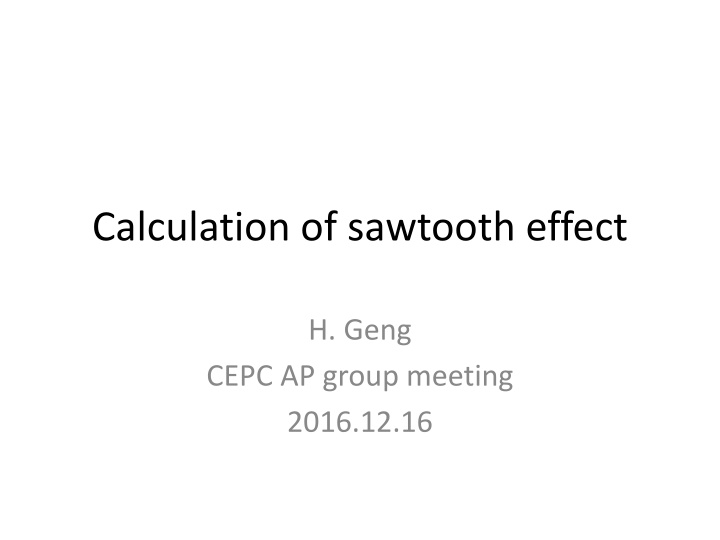
Simulating Sawtooth Effect in Particle Accelerators
Explore methods of simulating the sawtooth effect in particle accelerators, including manual adjustments and code-based calculations. Comparison of effects with and without feedback systems, chromaticity variations, and detailed analysis of optic distortion. Latest updates on simulation software SAD and case studies in different accelerator setups.
Download Presentation

Please find below an Image/Link to download the presentation.
The content on the website is provided AS IS for your information and personal use only. It may not be sold, licensed, or shared on other websites without obtaining consent from the author. If you encounter any issues during the download, it is possible that the publisher has removed the file from their server.
You are allowed to download the files provided on this website for personal or commercial use, subject to the condition that they are used lawfully. All files are the property of their respective owners.
The content on the website is provided AS IS for your information and personal use only. It may not be sold, licensed, or shared on other websites without obtaining consent from the author.
E N D
Presentation Transcript
Calculation of sawtooth effect H. Geng CEPC AP group meeting 2016.12.16
Contents Methods of simulating sawtooth effect Effects in ring w/o FFS Effects in ring w/ FFS Chromaticity comparison in different order Summary
Methods of simulating sawtooth effect I. Manually change the strength of each element according to the energy loss from synchrotron radiation II. Use code which can calculate optics while taking into account of synchrotron radiation effects (so far not working) The results from these two methods should agree with each other !
Methods II: latest version of SAD(V1.0.10.11k64-pre3) Our case (w/ FFS)
Methods II: latest version of SAD(V1.0.10.11k64-pre3) use (ring); ON RFSW ON RAD; ON RADCOD; ON CODPLOT; ON CALC6D; cell; cal; emit; draw bx by & dx & ddp; No distortion on optics observed. Still communicating with the author !
FCC case (half ring) Beta- beating
Methods I:Manually change the strength of each element according to the energy loss from synchrotron radiation Bending magnet redefined as: angle + K0, where K0 represents the effect from the energy loss due to synchrotron radiation Quadrupole and sextupoles are defined as: K1 and K2 multiple by a factor, this factor represents the effect from the energy loss due to synchrotron radiation The definition is checked by turn flag RADCOD OFF, and reproduce the results with the original lattice and flag RADCOD ON.
Single ring -v20140930-1/8 ring dE=0 RADCOD ON, SAD (B angle+K0)
Single ring -v20140930-1/8 ring dE=3012.9402/1952*10^6 V, RADCOD OFF,
Single ring -v20140930-1/8 ring FFS DE=0 V, cell, cal, emit, result DE=3012.9402/1952*10^6 V, cell, cal, emit, result Sawtooth
Sawtooth with FFS DE=3.0GeV dnux=0.05; dnuy=0.46 y*=0.415m
Optics with sawtooth effect Beta beating is clearly shown The effect mainly comes from FFS
Electron orbit @ IP1 Positron orbit @ IP1 8*10^-7 Positron orbit @ IP3 Electron orbit @ IP3
DA check before add DE DE=0, ? With DE=3GeV, unstable, no DA
DA when turn SR on ? ON RFSW ON RAD; ON RADCOD; ON CODPLOT; ? !ON RFSW !ON RAD; !ON RADCOD; !ON CODPLOT;
1/n N=2 N=5 N=10 N=15 SR
DA when n=20 2% DA 0
Fit high order chromaticity from tune Use this definition
Chromaticity up to 6thorder Ring w/ FFS no sawtooth Ring w/ FFS w/ sawtooth Ring w/o FFS No sawtooth Ring w/o FFS w/ sawtooth x y x y x y x y 1 2 3 -17.7 0.3 7.1 0.1 -3.9 -3.9 -3.9 -3.9 -50.9 -116.1 -1.3e4 -11.0 -48.9 74.9 -49.3 75.5 -5.1e6 -1.2e7 -1.3e9 -1.1e6 -4.9e6 7.5e6 -4.9e6 7.6e6 4 5 -2.3e8 -5.5e9 1.0e12 -5.9e8 3.6e8 -3.0e8 -1.6e8 2.0e8 -1.1e14 -6.1e13 -3.0e15 8.4e13 -4.2e13 1.6e13 2.6e13 - 3.6e13 6 2.9e19 1.7e19 2.8e19 -1.7e19 4.3e18 3.8e18 -8.2e17 1.8e18
Summary The effect of sawtooth in dramatic for lattice with FFS Work is still ongoing
